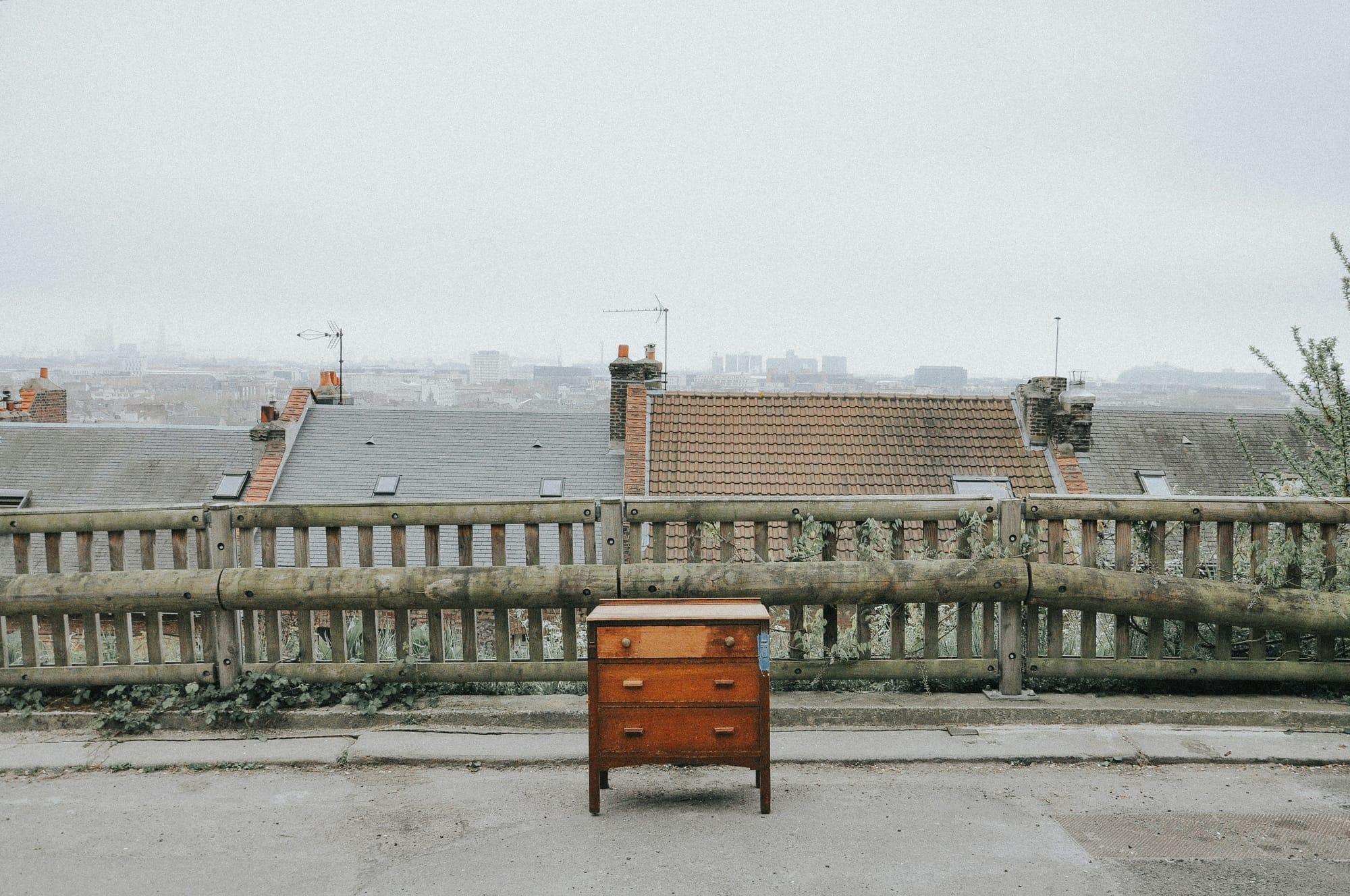Furniture with Meaning
Reflecting on inherited furniture, the author sees it as a link to family history, embodying wisdom, love, and hard work. Amidst decluttering, they ponder the balance between cherishing the past and making room for new stories, viewing furniture as both a personal milestone and a bridge to heritage.

When you receive furniture, you must decide does it stay or does it go?
My grandfather immigrated to the U.S. from Lebanon. He began his career at 14, shining shoes and working in coal mines. He did not finish high school. When he felt as though he had “made it” – having graduated to an independent, multi-project general contractor after walking onto a construction site as day labor – he purchased a set of beautiful chairs. They were made of thick, rounded mahogany and stuffed black, buttoned leather.
When I was young, I would sit in one chair while he sat in the other. We could converse about life. We happened to have the same name (Lawrence Abraham). We would converse, and he would find ways to dispense the wisdom he had gained over 90 years. The chairs are now in my home office and feature as my Zoom background.
Furniture can hold a lot of history and so a lot of meaning. While we may move away from a home never to see it again, we can take furniture items with us. In fact, the Latin etymology for “furniture” – mueble in Spanish, mobilia in Italian – literally means “moveable.”
Meaning Overload
It’s not just the chairs.
My father, by coincidence, had a furniture store. Perhaps inspired by his father, he loved wooden furniture and opened a furniture store, “Leather and Oak.” He imported furniture from Brazil. In his time doing this, he fell in love with an oak desk with a large leather top. It is the desk I am writing on today. Whereas the desk under his tenure was always covered in papers, under mine, the desk was empty save a laptop.
My great-grandmother was a gardener. She grew food and flowers. She grew food, in part, to make large Lebanese meals that would feed her family. I grew up receiving love by being fed. And indeed, I show love by hosting friends and loved ones for dinner. When my family sits down with guests, we sit around my great-grandmother’s dining room table.
I could go on. Rather than do so, I’ll point out that I have a small storage unit chock full of furniture that had meaning to my family but no longer has meaning to me. I believe furniture represents a sacred link to the past for many immigrant families. My family couldn’t bear to have this furniture go anywhere else but to our blood (me). Yet I don’t want it, and I haven’t found the courage to let it (all of it) go.
While my grandfather was immensely proud to have anything at all – he grew up as an immigrant in the Depression that would instill a kind of deprivation – my father and mother, perhaps as a response, had too much stuff. Not necessarily nice stuff. I’d dare say they were functional hoarders.
I still remember when my cofounder Dane kindly arrived to help me navigate the stuff deluge. We had just finished unloading the moving truck. Dane, my dear minimalist friend, was clearly shaken by the quantity of stuff we’d unpacked. That’s when the second moving truck arrived.
Stuff Membranes
When my Dad died, most of the meaning to me in his stuff was to be released from it. There were many reasons. Among them, I needed to make space for my own stuff with its own meaning. Still, most of the stuff I kept was furniture, as furniture is expensive. Not having to buy a couch or a side table is appealing. And so it is, I believe, that many dwellers end up with family furniture.
We all have a kind of membrane – a stuff membrane. We decide what stuff enters our life and what stuff does not, what stuff exits, where the stuff comes from, and where it goes. This is true for all stuff and especially for furniture. Some furniture enters the membrane because it’s functional. Other stuff enters the membrane because it’s meaningful. Some stuff exits the membrane because it’s meaningful.
Indeed, my “stuff membrane” is not just a selective filter for stuff but for the stories they tell about who I am and who I hope to be. What is meaningful to me about my chairs, my desk, and my dining table is not the furniture per se, but instead the way they connect me with my past, anchor my present and guide me toward the future. I wish to be wise like my grandfather, work hard like my Dad, and show love through hosting like my great-grandmother and everyone after her.
Letting go of furniture (all of it save the storage unit) does not erase the past but rather enables me to embrace the present and future in my own way, making space for new stories, like building Spoken.
Something I’ve heard a lot from our users is that they have arrived at a place in life where they are ready to be proud of buying something for themselves. Not a used item but adult furniture — a signal that they are secure enough in their life to invest in something that will last. Much like my grandfather.
One user suggested, “I may not be able to buy a house in a major U.S. urban City, but I can invest in nice furniture.” How cool that furniture can represent this kind of pride.
Meaning in a Future Past
As I sit at my oak desk, I can’t help but ponder what will happen to these items that mean much to me. Maybe they will become meaningful to someone else — my daughter or a friend who loves me. Or maybe the primary meaning of them will be that they are released.
Perhaps the most enduring legacy of my family is not the furniture or even the stories but my ability to discern which stories matter and why and my courage to live into them. These are the values my family imbued in me. And indeed, at least in part, the values that animate how we build this site.

Geoff Abraham
Co-founder & President of Spoken
Geoff is the co-founder and President of Spoken. He is a Dad. He holds a BA from UT Austin (Plan II) and an MBA from Stanford. Geoff has built several successful businesses, including a bicycle taxi business in San Francisco which he ran for 10 years with his wife, Mimosa. He is an executive coach, and he actively invests in seed-stage startups via The Explorer Fund.
Read more